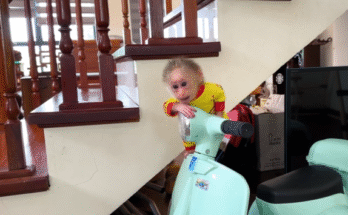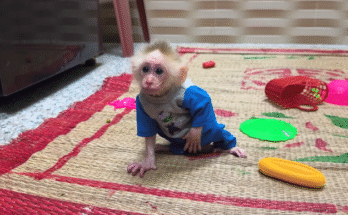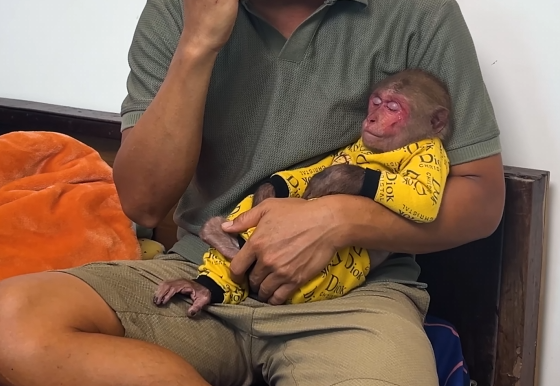
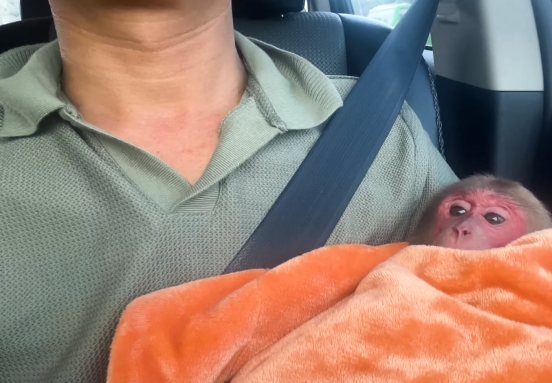
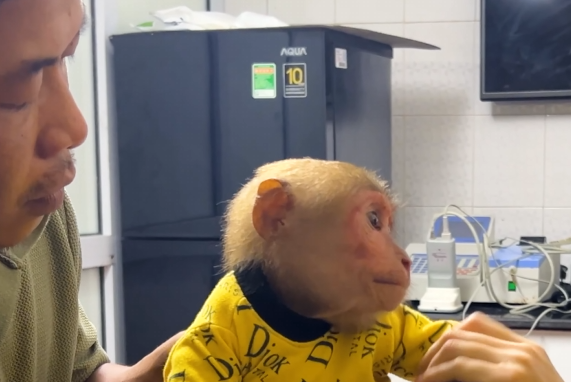
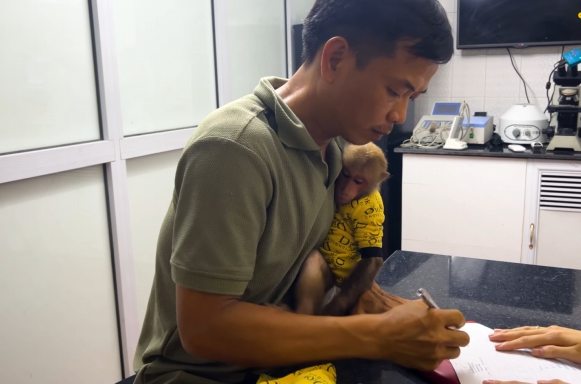
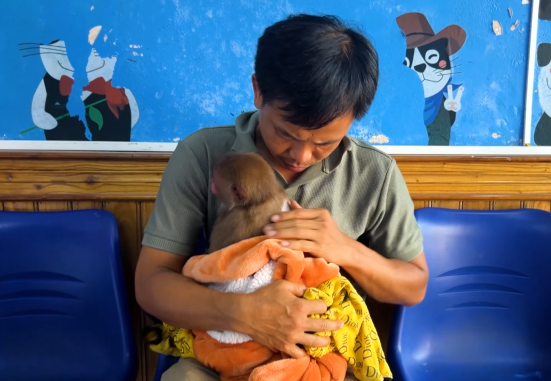
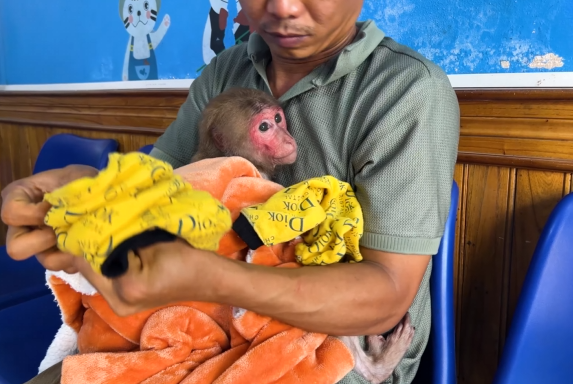
Bibi, the sweet and playful golden-furred monkey, had always been the life of the sanctuary. With her bright eyes and cheeky personality, she had stolen the hearts of everyone who met her. Whether she was swinging from tree to tree or cuddling up to her caretaker, Bibi’s energy was contagious. But lately, something had changed.
For a few days, Bibi had been unusually quiet. She wasn’t eating much, barely played with her favorite toys, and even her morning chatter had gone silent. Her caretaker, Lina, grew worried. She had spent years caring for rescued animals, and she knew the signs of illness when she saw them. Bibi wasn’t just tired—something was wrong.
On the fourth morning of Bibi’s unusual behavior, Lina gently approached her with a banana, hoping to tempt her into eating. But Bibi just looked at it, then turned her head away and curled into a ball. That was the moment Lina knew it was time for action.
“I’m taking her to the clinic,” Lina said, wrapping Bibi gently in a soft blanket. “We’re going to get to the bottom of this.”
The sanctuary’s vet clinic was equipped with modern tools, thanks to generous donations and the hard work of the staff. Bibi was quickly admitted, and Dr. Sareth, the experienced veterinarian, was already waiting.
“She’s lethargic and not eating,” Lina explained. “I don’t know what’s wrong, but she’s not herself.”
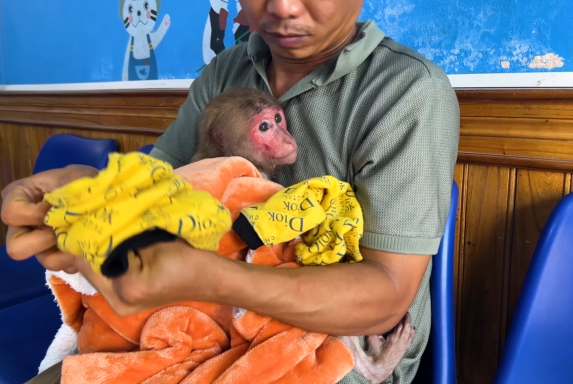
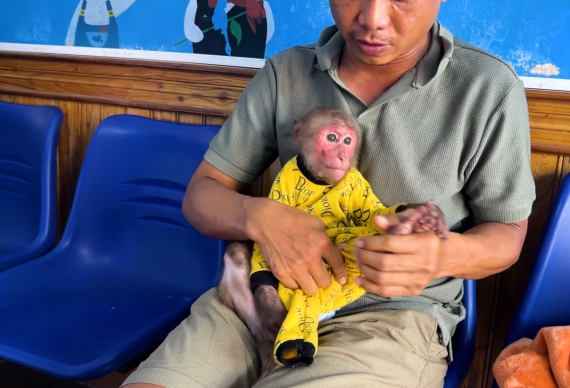
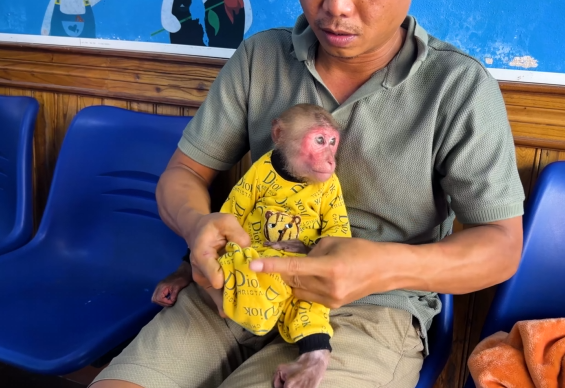
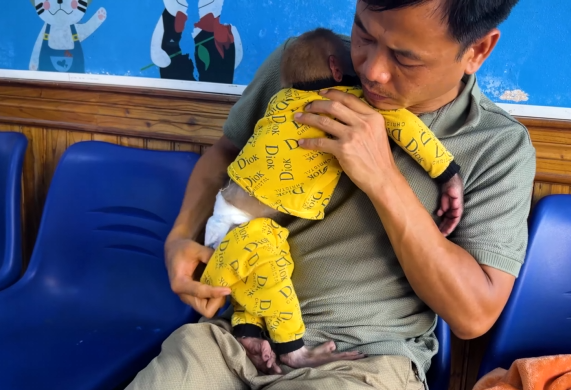
Dr. Sareth nodded thoughtfully. “We’ll start with a full health check. Blood tests, stool samples, hydration levels, and then an X-ray if we still don’t find a cause.”
Bibi clung to Lina’s arm, clearly scared by the unfamiliar surroundings. Lina stayed close, whispering comforting words. The veterinary team moved gently, taking great care not to stress Bibi further.
First came the physical exam. Dr. Sareth checked her heart, lungs, and abdomen. Her heartbeat was slightly fast, and her breathing a little shallow. Her gums were pale, and her stomach felt a bit tense. These were all signs that something was going on inside.
Next came the blood test. Lina held Bibi still while the technician drew a small vial of blood. Bibi let out a quiet whimper, and Lina kissed her on the head. “You’re so brave, Bibi. We’re going to help you get better.”
The clinic ran the blood work through an analyzer. Within 30 minutes, the results came in. Her white blood cell count was elevated—possibly a sign of infection. But there was nothing conclusive yet.
“We’ll do an X-ray next,” Dr. Sareth said. “There might be something internal we can’t see just by touch or blood tests.”
The X-ray room was quiet and dimly lit. Lina gently laid Bibi down on the padded table, stroking her head to keep her calm. The technician positioned the machine and stepped back. A click and a short hum signaled the scan.
After a few minutes, the images appeared on the screen. Dr. Sareth studied them carefully. Then his expression changed. He zoomed in on Bibi’s abdomen and pointed.
“There,” he said, tracing the outline with his finger. “That’s a small obstruction in her digestive tract. It could be a foreign object—maybe something she swallowed while playing. That would explain the stomach tension, lack of appetite, and pain.”
Lina’s eyes widened. “Oh no… do we need surgery?”
“Not necessarily,” Dr. Sareth replied. “If it’s not sharp and hasn’t caused any tears, we might be able to help her pass it naturally with fluids, medication, and rest. But we need to monitor her closely.”
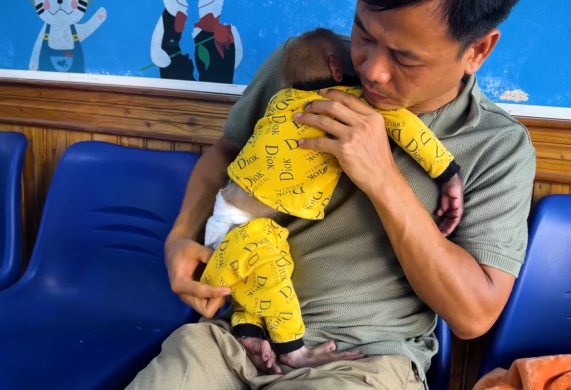
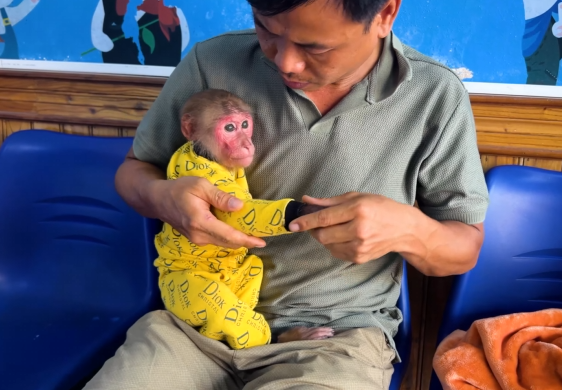
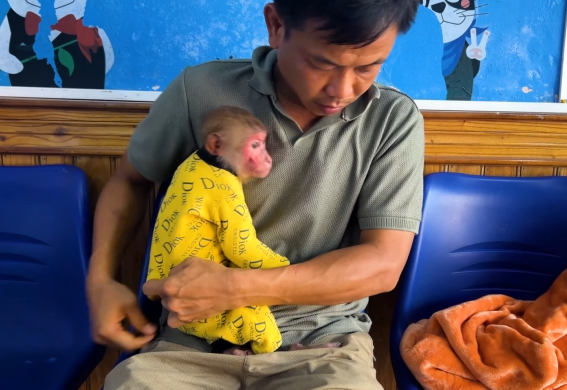
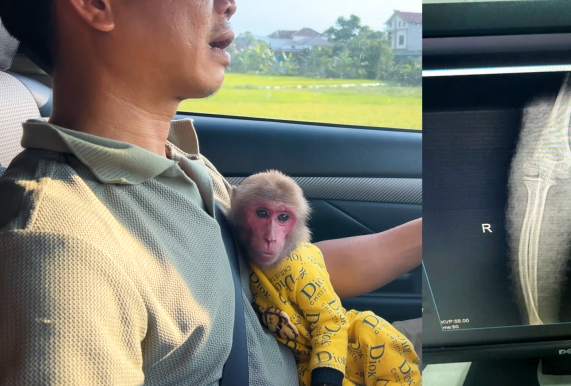
Bibi was moved to the observation room, where she was placed in a warm bed with soft blankets. A saline IV provided hydration, and she was given gentle medication to help ease the inflammation in her gut. Over the next 24 hours, Lina never left her side.
Every time Bibi stirred or whimpered, Lina was there with a gentle touch and soothing voice. She offered water through a syringe and wiped her face with a damp cloth. Slowly, Bibi began to perk up. By the second morning, she reached for a piece of mango. It wasn’t much, but it was a hopeful sign.
Later that day, Bibi had a bowel movement, and to everyone’s relief, the culprit was found: a small piece of rubber from a broken toy. It must have gotten lodged in her intestines, causing all the trouble. Once it passed, Bibi’s recovery was fast.
Dr. Sareth gave her another check-up and confirmed the worst was over. “No more rubber toys for Bibi,” he said with a smile. “She’s lucky she has someone like you watching over her, Lina.”
Lina laughed softly, tears in her eyes. “She’s like family.”
A few days later, Bibi was back at the sanctuary. Her energy had returned, and she was climbing trees, playing with the younger monkeys, and chirping happily. But now, Lina was even more vigilant—making sure the play areas were clear of anything dangerous.
Bibi had been through a lot, and so had Lina. But their bond had only grown stronger. The comprehensive health check, the careful X-ray, and the support of the vet team had saved Bibi’s life.
Back at the sanctuary, Lina hung up a new sign in the play area: “Safe Toys Only – For Our Precious Monkeys”.
And Bibi? She was back to her cheeky, banana-loving self—maybe even a little wiser. She still played and explored, but she never went near the rubber toys again.
Her story became a reminder to all the staff and volunteers about the importance of early detection, proper care, and, most of all, love.
Because sometimes, a quiet monkey isn’t just tired. Sometimes, she needs a little help—and a lot of heart—to heal.
